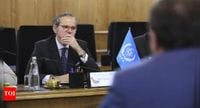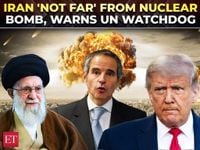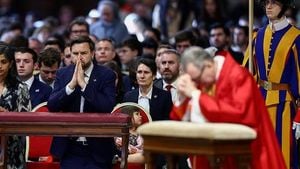In a critical moment for international diplomacy, talks between Iran and the United States regarding Tehran's advancing nuclear program are intensifying. Rafael Mariano Grossi, the head of the International Atomic Energy Agency (IAEA), stated on Thursday, April 17, 2025, that the negotiations are currently in a "very crucial" stage. His remarks came during a visit to Iran, where he underscored the potential role of the IAEA in verifying compliance should an agreement be reached.
The upcoming discussions are set to take place on Saturday, April 19, 2025, in Rome, following a preliminary meeting last weekend in Oman. This latest round of negotiations is particularly significant against the backdrop of escalating geopolitical tensions in the Middle East, especially as the Israel-Hamas conflict continues to unfold in the Gaza Strip.
Grossi's visit coincided with a landmark visit from Saudi Arabia's defense minister, Prince Khalid bin Salman, marking the highest-ranking official from the kingdom to visit Iran since the two nations entered a détente mediated by China in 2023. The convergence of these diplomatic efforts highlights the intricate web of relationships and tensions that define the region.
During his visit, Grossi met with Iranian Foreign Minister Abbas Araghchi and later with Mohammad Eslami, the head of the Atomic Energy Organization of Iran. He also toured facilities showcasing Iran's civilian nuclear projects. Grossi emphasized the urgency of the situation, stating, "We know that we are in a very crucial, I would say, stage of this important negotiation, so I want to concentrate on the positive. There is a possibility of a good outcome. Nothing is guaranteed. We need to make sure that we put all of the elements in place ... in order to get to this agreement."
In light of U.S. President Donald Trump's consistent threats to launch airstrikes targeting Iran's nuclear capabilities if a deal is not reached, the stakes are undeniably high. Trump has made it clear that he views Iran's nuclear advancements as a significant threat, and the possibility of military action looms large over the negotiations.
Grossi addressed these threats, urging stakeholders to remain focused on the objective of reaching an agreement. He stated, "Once we get to our objective, all of these things will evaporate because there will be no reason for concern." This sentiment reflects a cautious optimism amid the uncertainty surrounding the talks.
Iran's nuclear program has faced intense scrutiny since the collapse of the nuclear deal in 2018, when the U.S. unilaterally withdrew from the accord. Since then, Iran has abandoned all previous limits on its nuclear activities, enriching uranium to levels as high as 60% purity—just shy of the weapons-grade threshold of 90%. This escalation has raised alarms among Western nations and the IAEA, which continues to seek access to monitor Iran's nuclear activities.
Despite ongoing tensions, Grossi noted that the IAEA's access to Iran has not been entirely revoked, although significant challenges remain. Surveillance cameras installed by the IAEA have been disrupted, and Iran has restricted access for some of the agency's most experienced inspectors. This situation has led to concerns about transparency and compliance, further complicating the diplomatic landscape.
As the negotiations approach, the international community remains watchful. The potential for a nuclear-armed Iran has been a longstanding concern since Tehran abandoned its organized weapons program in 2003. Iranian officials have increasingly hinted at the possibility of pursuing atomic weapons, which has drawn widespread condemnation and concern from Western powers.
In a statement reflecting Iran's position, Eslami emphasized the need for the IAEA to "maintain impartiality and act professionally." This call for professionalism underscores the delicate balance that must be maintained as negotiations progress.
While the outcome of the upcoming talks remains uncertain, the convergence of diplomatic efforts from multiple nations—including the recent Saudi visit—suggests a complex interplay of interests in the region. The ongoing Israel-Hamas conflict adds another layer of urgency to the negotiations, as stakeholders grapple with the implications of a potential nuclear agreement.
The international community is acutely aware of the ramifications of these talks. Should Iran continue to enrich uranium and advance its nuclear capabilities unchecked, the consequences could be dire, not only for regional stability but also for global security.
As the world watches and waits, the upcoming discussions in Rome will be pivotal in shaping the future of Iran's nuclear program and the broader geopolitical landscape. The stakes are undeniably high, and the path forward remains fraught with challenges.
In the coming days, all eyes will be on the negotiations as key players strive to achieve a diplomatic resolution that could alter the course of history in the Middle East.





